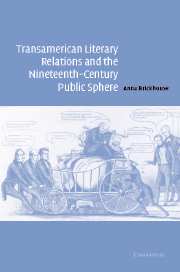Book contents
- Frontmatter
- Contents
- Acknowledgments
- Note on texts and translations
- Prologue
- 1 Introduction: transamerican renaissance
- 2 Scattered traditions: the transamerican genealogies of Jicoténcal
- 3 A francophone view of comparative American literature: Revue des Colonies and the translations of abolition
- 4 Cuban stories
- 5 Hawthorne's Mexican genealogies
- 6 Transamerican theatre: Pierre Faubert and L'Oncle Tom
- Epilogue
- Notes
- Index
1 - Introduction: transamerican renaissance
Published online by Cambridge University Press: 22 September 2009
- Frontmatter
- Contents
- Acknowledgments
- Note on texts and translations
- Prologue
- 1 Introduction: transamerican renaissance
- 2 Scattered traditions: the transamerican genealogies of Jicoténcal
- 3 A francophone view of comparative American literature: Revue des Colonies and the translations of abolition
- 4 Cuban stories
- 5 Hawthorne's Mexican genealogies
- 6 Transamerican theatre: Pierre Faubert and L'Oncle Tom
- Epilogue
- Notes
- Index
Summary
So multiplied are the connexions existing between nation and nation in modern times, that intellectual originality may justly be regarded as one of the greatest phenomena in nature.
Walter Channing, “Essay on American Language and Literature” (1815)BLINDNESS AND BINOCULARITY
In the September 1815 issue of the North American Review, Walter Channing described in searing terms the “melancholy record” of literary production in the United States in an essay that would set the tone for discussions of the national literature for decades to come. Responding to his “transatlantick brethren” in England, Channing took from the pages of the London Quarterly Review a pronouncement upon nineteenth-century modernity that served as an epigraph to his essay (and serves this chapter in the same capacity). Channing's essay promotes his own “unqualified belief” in the British-authored thesis in order to justify what he perceives as “the barrenness of American Literature” – and, in an ironic reversal seemingly lost on Channing himself, to call for a revolution of literary and intellectual independence from Europe. Partially disabling to this revolution, as Channing sees it, has been the ascendancy of a transnational arena of cultural exchange – a fraught matrix of linguistic as well as human crossings, of “multiplied … connexions existing between nation and nation” – that his argument both appropriates and curiously elides.
- Type
- Chapter
- Information
- Publisher: Cambridge University PressPrint publication year: 2004

